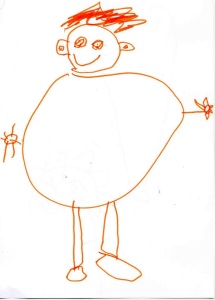I’ve just finished the first draft of my novel and am feeling very pleased with myself. There are several reasons for this, other than the obvious one that I won the race with Drama Duck after all (take that, nine-year-old!).
One is having proved that I can actually finish a whole novel. I am a notorious starter but a very bad finisher, in all aspects of life. Even my children are aware of this and roll their eyes whenever I start a new quilt, suggesting that I should instead finish one of the gazillions of UFOs (UnFinished Objects) in the quilting cupboard.
A less obvious reason is that now I can finally allow myself to start revising that sucker. The only way I could finish was to start at the beginning, not do any editing and just keep writing till I got to the end. In the past I’ve always been lured down the editing cul de sac, never to return to the story highway.
Pleased as I am with the result, one consequence of this new way of working was that every time I called up my file I had to stare at the first page of the novel. At first this was a bright shiny experience. Look at that beautiful beginning! See how cleverly it hooks the interest! But after a while the effects of first love wore off and I began to notice (gasp!) that there were flaws in the previously beloved opening. That first sentence that I’d thought was so cute was in fact in a different point of view to the rest of the scene. And then came the dreadful day when I realised that a lot of what came after it was, well, a bit boring. Back story. Told instead of shown. How could I ever have thought this crap was any good? The romance was over! But I wasn’t allowed to fix it till the first draft was finished – that was the deal.
So I’ve been thinking a lot about beginnings. What makes a good one? “Once upon a time” works pretty well for fairy tale writers, but the rest of us have to make more of an effort. There’s lots of good advice out there: start with a hook, jump straight into the action, pose a question that the reader wants answered (Tabitha Olson has a good post about this). Simon Haynes has been pondering beginnings recently too, wondering whether to stick with the slow-burning fuse start his books usually have or jump straight into the bomb blast.
Beginnings that I love include this one from Welcome to Temptation by Jennifer Crusie:
“Sophie Dempsey didn’t like Temptation even before the Garveys smashed into her ’86 Civic, broke her sister’s sunglasses, and confirmed all her worst suspicions about people from small towns who drove beige Cadillacs.”
This tells you so much without being an infodump. It gives you a lot of facts about the story plus a feel for the personality and background of the main character, all in such an amusing way that you can’t help wanting to read more. Why is Sophie in Temptation, a place she clearly doesn’t want to be? What other disasters are in store?
One that made me laugh out loud was Montana Sky by Nora Roberts:
“Being dead didn’t make Jack Mercy less of a son of a bitch. One week of dead didn’t offset sixty-eight years of living mean.”
What a great opener! The voice is so down-to-earth, so full of personality, I couldn’t wait to read more. So why are all these people at his funeral if he was such a bastard? You have to keep reading to find out. And that’s why it works. No bombs, just a dead guy in a box, but I’m hooked.
So now I have to find my story’s equivalent to dead guy in a box. Doesn’t have to be funny, though funny is good; just memorable. Gotta give those readers a reason to keep turning the pages. Assuming that there ever are any readers, of course. But let’s not get ahead of ourselves here.





